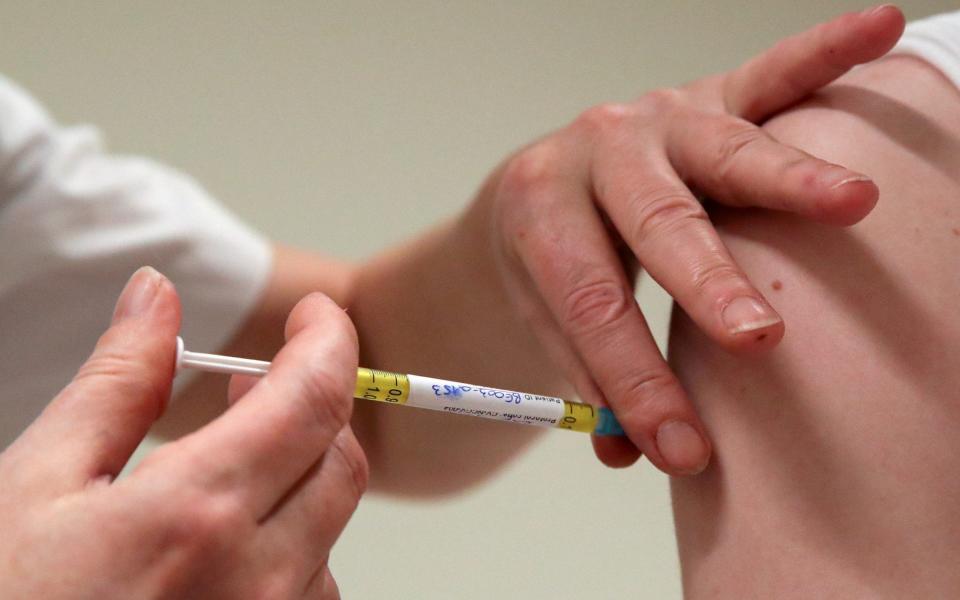German drugmaker accused of stealing Covid vaccine technology

The team behind Britain’s most-used Covid booster vaccine is being sued by a German pharmaceutical firm which has accused it of stealing the technology behind the jab.
CureVac has filed a lawsuit against BioNTech in Germany, saying it is seeking “fair compensation” for infringement of its intellectual property rights related to the mRNA technology used in the vaccine.
It comes a year after CureVac abandoned its own efforts at developing a Covid jab following late-stage trials which suggested it was less effective than rival vaccines already on the market. At the time, CureVac’s chief executive, Franz-Werner Hass, said it would instead focus on a “more efficacious” second-generation Covid vaccine with GlaxoSmithKline, “instead of very late with the first generation”.
In filing the lawsuit, CureVac said it was not looking to stop BioNTech from making or selling the vaccine, and that it “considers the rapid development of these vaccines a tremendous achievement, with unprecedented positive impact for global public health”.
A spokesman said: “This achievement is based on decades of scientific research and innovation, supported by CureVac as the earliest pioneer in mRNA technology.
“Accordingly, CureVac’s intellectual property rights need to be acknowledged and respected in the form of a fair compensation to reinvest into the further advancement of mRNA technology and the ongoing development of new classes of life saving medicines.” Mr Haas told the Financial Times that BioNTech was “standing a bit on our shoulders”.
He added: “There’s no way we would have done [the lawsuit] earlier, in the middle of the development of this product, because the vaccine was needed for the world to turn into whatever is normal now.”
Messenger RNA (mRNA) vaccines use technology that delivers a small piece of genetic code through a tiny fat bubble, which then tricks the body into making coronavirus proteins so the immune system can learn how to respond to the virus. Prior to the pandemic, no vaccines based on mRNA technology had been approved.
Pfizer and BioNTech’s Covid vaccine has been among the most widely used across the world and has been instrumental to the UK’s booster rollout. Of the 38.9m booster jabs given in the UK up until June 15, 30.5 million have been Pfizer-BioNTech vaccines.
It has resulted in significant sales boosts for the two companies, with BioNTech earlier this year saying it made between €16bn (£13.8bn) and €17bn in revenues from the vaccine in 2021. It said it was on course to make between €13bn and €17bn in Covid jab revenues this year - with earnings to be spent on new vaccines and cancer treatments.
CureVac, meanwhile, saw losses swell last year, hitting €412m in 2021 compared to €110m a year earlier. Its shares are down 74pc since August 2020, having plunged after it announced it was abandoning its first Covid vaccine last October. The UK had initially ordered 50m doses of the CureVac vaccine, while the EU had struck a deal for more than 400m doses of the vaccine - before work on that original jab was abandoned by CureVac.
CureVac will be hopeful of a boost from its Covid variant vaccine, which in April it said had shown promising signs. The vaccine, based around the Beta and Delta variant, showed “protective efficacy” when trialled on mice, it said.
BioNTech responded to the lawsuit by saying it values and respects valid intellectual property rights. A spokesman said: “BioNTech’s work is original, and we will vigorously defend it against all allegations of patent infringement.
“However, we are aware that it is not unusual that other companies in the pharmaceutical industry, having witnessed the success of Comirnaty, are now suggesting that the vaccine potentially infringes their intellectual property rights.”

 Yahoo Finance
Yahoo Finance 